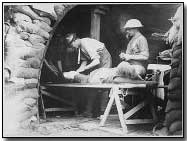Memoirs & Diaries - War is War - Army Life
 "I was
always one of those unfortunates who seemed fated to extract strong
invective from earnest young non-coms... one of our own corporals once
called me a "bloody yellow dog-faced Antichrist" - which, for a bit of
impromptu, I thought rather good."
"I was
always one of those unfortunates who seemed fated to extract strong
invective from earnest young non-coms... one of our own corporals once
called me a "bloody yellow dog-faced Antichrist" - which, for a bit of
impromptu, I thought rather good."
"In one of (the brothels in Le Havre) it was said, one of the sirens wore the uniform of a British captain, and was much in demand among the disrespectful Tommies. If this were true it was a brain-wave on the part of the lady."
"Looking back across the years, and a great deal mellowed by time, I still say that those who were responsible for the administration of the base camps in France should be hanged as high as Haman. Rations were always shortest when there was no excuse for a shortage, and cooking was always at its worst where there was every appliance to hand.
"Moreover the 'permanent base' people of all ranks were indeed permanently base. The unofficial motto of the Army, "---- you, Jack, I'm all right!" was screamed at one on every hand. I gave up trying to count the decayed, dug-out old colonels who ought to have died in their beds years since. There they were, purple, alcoholic, pompous, over-fed, strutting and preening, getting in everybody's way and doing nothing except eat a good man's food and draw a good man's money.
"The N.C.O.'s were futile, brazen-voiced asses, clinging to their jobs as drowning men are supposed to cling to straws. An N.C.O. of that particular type could often get a job at the base and bully the poor fools of better men who were going up the line to die for him. The rank and file consisted largely of professional footballers, pugilists and other athletes who were naturally too delicate to endure life in the trenches.
"The worst of being in a quiet part of the line is that one sees too much of the Staff. They are very bad for one's ego. It is bad to hate people. One cannot conjure up a personal hatred for shells - or for the people who are merely doing their job by sending them over - but it is easy to conceive a hellish hatred for Staff officers...
"Where there was no fighting nor likelihood of fighting, the Staff-birds mooched about the front line and supports to show us how brave they were, and to put a spoke in wheels which were running quite smoothly without them. It was only when things were going badly that we needed these talented gentlemen, and then they were always safe, winning the war by the exercise of their intellects, in farmhouses a dozen miles or so behind the lines...
"They were much too well groomed, obviously well fed, and had not neglected their beauty sleep. Some of the younger ones we knew to be cowards who had been turfed out of the line because they were unfit to lead men... one could have forgiven this and merely envied them their good luck were it not for their behaviour towards us... in my battalion there were men better born, better bred and better educated than many of these organ grinders' monkeys in their primrose-coloured breeches."
There were moments of playfulness before lodgings and life in general got much worse for his unit: "Duckboard Bill is a sybarite with an air-cushion which he uses for a pillow. This he plants on the beams at the head of his bunk. Rats run along the beams but they will not cross Duckboard Bill's face unless they are frightened. They way to make them is to focus one... with the light of an electric torch. The rat runs along the beam to try to dodge the light and eventually skips lightly over the corporal's countenance. He wakes up spitting. Great fun for everybody except Duckboard Bill, who cannot understand what makes the rats so fond of him."
On "going up the line": "I believe the system of the Army was to make men so tired and miserable by the time they reached the front line as to be entirely indifferent to their lives and destinies. No happy man wants to die... and looking back on it dispassionately... I must freely admit that it was as sound as it was cruel."
On Robert Browning: "I took a deep delight in re-reading the poems that I already knew by heart. I saw already the necessity for preserving what was left of my soul and not becoming altogether the kind of beast into which the exigencies of our lives were slowly but surely transforming us."
Next - Censorship and Broken Cities
Photographs courtesy of Photos of the Great War website
'Push' was slang signifying a large-scale attack upon enemy positions.
- Did you know?
